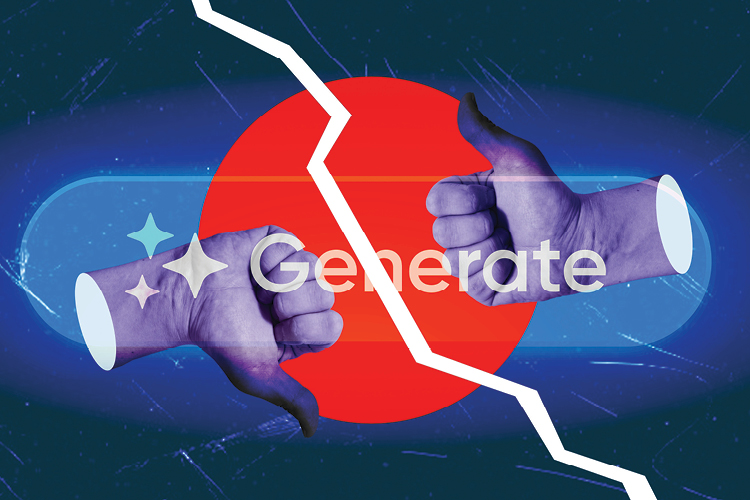While some firms embrace generative AI tools, others approach with caution

Photo illustration by Sara Wadford/ABA Journal
Thanks to generative artificial intelligence, overwhelmed attorneys may be only one click away from saving themselves hours, if not days, of work.
It’s no surprise then that the AI legal software market is expected to snowball from $1.3 billion in 2022 to a whopping $8.7 billion in 2030, according to Global Industry Analysts, a market research firm.
But while 73% of lawyers say they plan on using generative AI for their legal work within the next year, according to a 2023 Wolters Kluwer study, there are a smattering of firms that are still hesitant to embrace it.
Michael & Associates, a small Texas criminal defense law firm with nine attorneys, has taken a stand against generative AI because it is concerned with confidentiality.
“If a law firm enters identifiable details of a client into generative AI, that information could very likely show up somewhere else that isn’t connected to the case, client or law firm,” says Ben Michael, founder and managing partner of the firm. “Until this issue is resolved, we’ve made the choice not to use the technology.”
The privacy issue is a major one. Last year, Michael Best & Friedrich made headlines when it banned its lawyers from using ChatGPT at work over doubts that they could safely navigate data concerns. The firm didn’t respond to requests for comment.
 Raiford Dalton Palmer. (Photo courtesy of STG Divorce Law/Jessica Remus Photography
Raiford Dalton Palmer. (Photo courtesy of STG Divorce Law/Jessica Remus PhotographyOther firms have encountered different serious issues with artificial intelligence. In July 2023, Zachariah Crabill—a Colorado attorney just two years out of law school—was fired from his job at Baker Law Group when he used ChatGPT to help him write a motion. Unfortunately, the chatbot had entered incorrect legal citations that Crabill failed to catch. Crabill was suspended by the Colorado Supreme Court in November for 90 days pending completion of a two-year probation period.
He’s not the only one who was burned by the bots. Peter LoDuca and Steven Allen Schwartz of Levidow, Levidow & Oberman in New York City were fined $5,000 by a federal judge (though to date, they have not been disciplined by the Appellate Division of the New York State Supreme Court) after using ChatGPT to write a legal brief littered with fabricated quotes and court opinions.
Ready for prime time?
But at a time when 70% of in-house counsel expect law firms to use generative AI, according to a 2023 LexisNexis study, how do the outliers keep up with efficiency and competitors? And how do they even attempt to curb their attorneys’ use of such a tempting technology?
Raiford Dalton Palmer, the managing shareholder of Chicago-based STG Divorce Law, says his 10-attorney firm allows the use of AI with firm boundaries. Modeling his rule after a January ethics opinion from the Florida Bar that determined lawyers may use AI but need to do so carefully, Palmer created a policy for his firm that outlines how they can and can’t use the technology.
The policy details clauses regarding client confidentiality and data security (they are not permitted to input client names or other identifying information); they cannot rely on AI for decision-making; and the entire staff must attend training sessions to learn more about the capabilities and limitations of the tools.
“I came up with the policy a few weeks ago, but with this, there’s nothing new,” Palmer says, comparing the reliance on artificial intelligence with using paralegals and other help.
“Early on, I would do a bunch of legal research, hand it to my boss, and my boss was responsible for pleading and signing,” Palmer says. “I was the AI. There’s not much need for alarm now, provided people are aware of the limitations of the tools.”
And these tools, though they’re continually evolving, have their limitations. For example, Spellbook, a generative AI designed for lawyers, recently made a pitch to STG Divorce Law, demonstrating how its software could help. But while Spellbook does a great job of analyzing contracts in seconds, it’s not well-suited for Palmer’s firm yet because it doesn’t automatically plug in Illinois-specific laws.
“We played with it and realized it isn’t ready for prime time for our purposes,” Palmer says. “They said they could create a customizable version for us, and we may look into it further down the road.”
 Jonathan Handel. (Photo courtesy of Jonathan Handel)
Jonathan Handel. (Photo courtesy of Jonathan Handel)In the meantime, however, over 17,000 law firms and in-house legal teams are already using Spellbook—along with the thousands of other firms that are using other generative AI systems.
Only 6% of firms are banning unauthorized usage altogether, according to a survey by Thomson Reuters. If generative AI can save firms time and money, would those that choose not to hop on the bandwagon be left in the dust?
Many of the firms that are hesitant about AI are still using it—but they aren’t depending on it by any means.
Louis Patino, founder and personal injury attorney at Patino Law Firm in Texas, says he’s nervous about AI after reading about the firms that have been reprimanded because they relied on it for legal research—and the case law cited didn’t exist.
So while search engine optimization is a big source of leads for his niche, and while he’s increasingly seeing other firms publish AI-generated content, he’s planning on waiting.
That doesn’t mean he’s not using AI at all, though. Patino still sees its value.
“I’ve used AI to improve my grammar and phrasing and for brainstorming ideas or outlining content for my website, but I don’t think I would ever completely rely on it for legal theories or any task that impacts my clients’ rights,” he says.
Jonathan Handel, an entertainment and technology attorney at Feig/Finkel in Los Angeles, agrees. He says the technology is changing so quickly that it’s not a bad idea to wait a little longer until it reaches sturdier ground.
“Whether the technology in law is fit for prime time is open to question,” he says. “If you use a Google search with the AI enhancement, it does offer footnotes, but it didn’t do this even two months ago.”
But, Handel says, he wouldn’t go so far as to ban attorneys from playing around with the tech.
“If you prohibit your associates from even learning about this, you might as well shackle them at the feet … because you’ll limit their growth,” he says.
This story was originally published in the June-July 2024 issue of the ABA Journal under the headline: “Approach with Caution: While some law firms have embraced generative AI tools, others have gone a very different route.”



